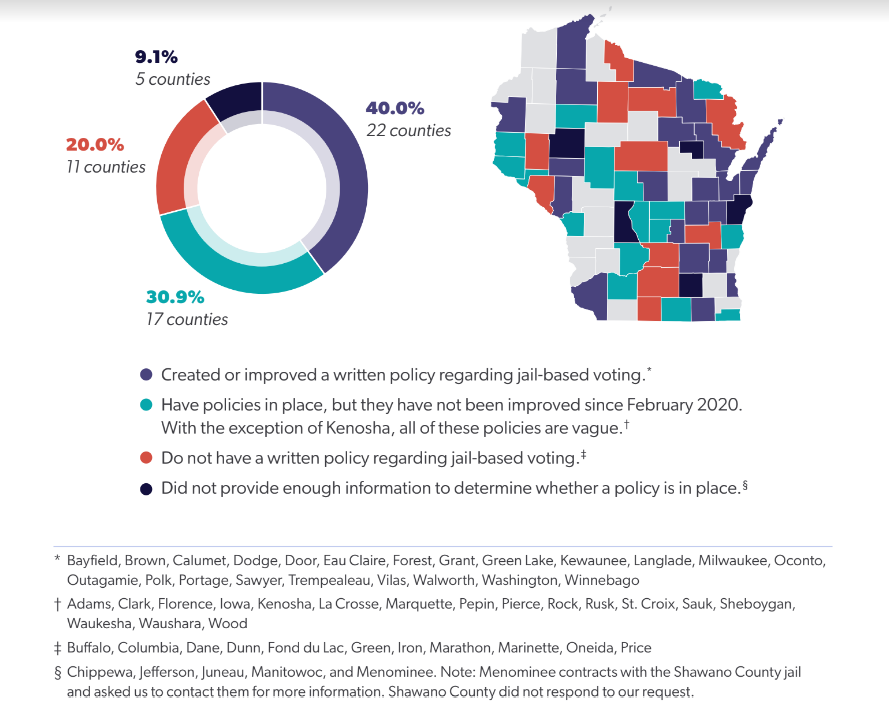Report: 50 of 13,000 inmates voted from jail in 2020
By: Michaela Paukner, [email protected]//June 24, 2021//
Report: 50 of 13,000 inmates voted from jail in 2020
By: Michaela Paukner, [email protected]//June 24, 2021//
A new report suggests that only 50 of the approximately 13,000 people in Wisconsin jails cast a ballot in 2020 elections.
All Voting is Local, the League of Women Voters of Wisconsin and the ACLU of Wisconsin released the Ballots for All: Ensuring Eligible Wisconsinites in Jail Have Equal Access to Voting report on Wednesday. It’s an update to a previous report released last July.
In the last year, many jail administrators have taken small steps to increase ballot access for incarcerated individuals, according to the report, but voting barriers remain for the approximately 13,000 people incarcerated in Wisconsin’s jails at any given time.
The report found that about 70% of the 55 responding counties indicated having formal jail-based voting policies in place in 2021, compared to 47.5% of the 61 counties that responded in 2020. Eighteen counties created or improved their procedures for jail-based voting since 2020.

The League of Women Voters of Wisconsin said most people incarcerated in the Wisconsin do not become ineligible to vote unless they have been convicted of a felony. The organization estimates at least half of the approximately 13,000 people incarcerated in Wisconsin county jails are eligible to vote.
Eileen Newcomer, voter education manager for the League of Women Voters of Wisconsin, said it’s difficult to know the exact total number of eligible incarcerated voters because most jails don’t have a structured policy and procedure for determining how many people in their care are eligible to vote.
In any case, jail records indicate only 60 people registered from jail and 50 people voted from jail in the 2020 elections.
“Voting is the most powerful way to have your voice heard,” said David Carlson, smart justice regional organizer at the ACLU of Wisconsin, during a virtual press briefing on Wednesday. “With this de facto disenfranchisement for eligible voters who may be sitting in a jail, we are missing out on a very important resource to addressing the most severe problems that our communities are facing in Wisconsin.”
The report makes a number of recommendations for steps that jails, lawmakers and the Wisconsin Elections Commission could take to make jail-based voting easier.
Jails should build formal jail-based voting policies if they haven’t already, increase access to information about voting, and give inmates opportunities to register to vote and request absentee ballots, among other things.
Lawmakers, meanwhile, could require jails to follow the steps detailed in the report, while also expanding proof-of-identity options and voting infrastructure. The Wisconsin Elections Commission could provide clear guidance on how jail administrators and elections officials can support jail-based voting.
“We do hope that this leads to much-needed conversation and action so that de facto disenfranchisement of eligible voters is not allowed to continue,” Newcomer said.
The three groups are holding a virtual event for the public to discuss the report’s findings on July 13 at noon.
Legal News
- State Bar leaders remain deeply divided over special purpose trust
- Former Wisconsin college chancellor fired over porn career is fighting to keep his faculty post
- Pecker says he pledged to be Trump campaign’s ‘eyes and ears’ during 2016 race
- A conservative quest to limit diversity programs gains momentum in states
- Wisconsin prison inmate pleads not guilty to killing cellmate
- Waukesha man sentenced to 30 years for Sex Trafficking
- 12-year-old shot in Milwaukee Wednesday with ‘serious injuries’
- Milwaukee man convicted of laundering proceeds of business email compromise fraud schemes
- Giuliani, Meadows among 18 indicted in Arizona fake electors case
- Some State Bar diversity participants walk away from program
- Wisconsin court issues arrest warrant ‘in error’ for Minocqua Brewing owner
- Iranian nationals charged cyber campaign targeting U.S. Companies
WLJ People
- Power 30 Personal Injury Attorneys – Russell Nicolet
- Power 30 Personal Injury Attorneys – Benjamin Nicolet
- Power 30 Personal Injury Attorneys – Dustin T. Woehl
- Power 30 Personal Injury Attorneys – Katherine Metzger
- Power 30 Personal Injury Attorneys – Joseph Ryan
- Power 30 Personal Injury Attorneys – James M. Ryan
- Power 30 Personal Injury Attorneys – Dana Wachs
- Power 30 Personal Injury Attorneys – Mark L. Thomsen
- Power 30 Personal Injury Attorneys – Matthew Lein
- Power 30 Personal Injury Attorneys – Jeffrey A. Pitman
- Power 30 Personal Injury Attorneys – William Pemberton
- Power 30 Personal Injury Attorneys – Howard S. Sicula











